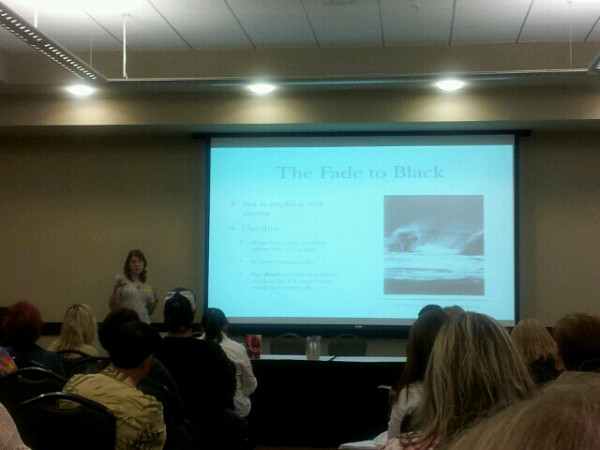 Photo by marnanel (click pic for link)This past weekend I attended the DFW Writer's Conference. And one of the most entertaining sessions of that conference is the Gong show. They did it last year and I wrote a post on it here. So I thought I'd do the same thing again since I think it's a really helpful exercise.
Photo by marnanel (click pic for link)This past weekend I attended the DFW Writer's Conference. And one of the most entertaining sessions of that conference is the Gong show. They did it last year and I wrote a post on it here. So I thought I'd do the same thing again since I think it's a really helpful exercise.
So basically this gong show consists of a panel of agents who sit at a table in front of the audience. They are each given their own personal gong to hit. Then either queries or first pages are read by a moderator. Everything is anonymous. And the agents hit the gong at the point they would stop reading. Once three agents have gonged, they give their explanation as to why they would've stopped reading.
I imagine this is pretty painful for those writers who volunteered their pages, but it's a fantastic learning experience. And it makes me realize that even over the past year, my own internal editor has gotten more refined because most of the time, I mentally "gonged" for the same reasons the agents did.
So what were some of the mistakes that got gonged?
In queries...
1. Starting with a question - Have you wondered what the world would be like if...
This is an old one (and was on last year's list), but apparently people are still doing it. One agent said that if you start with a question, 99% of the time, the answer is going to be 'no.'
2. Not giving the meat of the story - And he transforms into something no one expected...
You don't have to give away the ending, but if you're hiding the twist or the really interesting part because you don't want to "spoil" it, you're hurting yourself. If you don't hook the agent in that query, they're not going to ever get to those pages you want to surprise them with.
3. In YA, sounding like an adult trying to speak teen (or sounding patronizing).
4. Complaining about what is already out there. There is a void of really meaningful vampire stories out there, my story will change that...
This starts you off with a negative and makes you seem pompous. Don't tell them what you think is wrong with your genre. Just show them why your book is worth reading.
5. Using vague language or meaningless words. A story of love and betrayal, deep inner turmoil, and forgiveness...
What is your story about? Give the nitty gritty not all these vague themes.
6. Going on for too long and not getting to the point.
They want short and sweet. Give the main driving story of the novel and get out. You don't need to go into every subplot and every character.
7. Wasting words
One agent was particularly sensitive to things like, "I am writing you in hopes that you will consider..." All those extra words and stating the obvious made him think you may not write tight.
8. Zombies
Zombies were this year's "vampires". Not all the agents gonged them, but there was a definite aversion from some.
9. In YA, the guy/girl moving to a new school or the guy/girl discovering they have a power they never knew they had.
These are getting clichéd in YA.
On the opening page...
1. Not grounding the reader
For instance, starting with dialogue but we get no sense of where the people are or what's around them.
2. Starting with someone being chased through the woods, waking up, dreaming...
All these are cliché and will get you an immediate no from most of the agents present.
3. Using clichéd language.
Your writing needs to sound fresh. It's easy to slip into cliches because they are the first things that come to our mind. I seriously recommend checking out Margie Lawson's lecture packets about fresh writing. It will scare you off clichés forever and make you want to work harder.
4. Showing too much of your research.
This is like your slip showing. If you have to do research for a novel, you don't have to show the reader all of it. Leave some things tucked under your skirt. Only give the reader what they need and move on. Historical authors are particularly prone to this.
5. Not getting to a hooky moment fast enough.
This was the most common reason. They want conflict and action on the first page. It was okay to set up something in the first or second paragraph, but then they wanted to see the reason why they were supposed to be reading this story. Dumping in a bunch of character descriptions or yammering on about setting got old quickly. What is interesting on that first page?
There were more, but these are the ones that jumped out and got mentioned more than once. (Thanks to the brave souls who volunteered their queries and pages so that everyone else could learn.)
So what do you think? Any of these surprise you? Do you think you've fallen into any of these traps?


